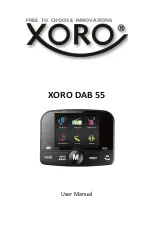
16
■
Identification Codes
An ID code is a combination of a 3-digit Fleet number and a 4-digit ID number.
Each transceiver must have its own Fleet and ID number.
• Enter a Fleet number (100 ~ 349) to make a group call.
• Enter an ID number (1000 ~ 4999) to make an individual call in your fleet.
• Enter a Fleet number followed by an ID number to make an individual call in your
desired fleet (Inter-fleet call).
• Select “ALL” Fleet and “ALL” ID to make a call to all units (Broadcast call).
• Select “ALL” Fleet and enter an ID number to make a call to the selected ID in all
fleets (Supervisor call).
Note:
◆
Broadcast and Supervisor calls are programmed functions that cannot be made with a
keypad.
◆
The ID range may be limited by programming.
S
TATUS
M
ESSAGE
You can send and receive 2-digit Status messages (10 ~ 79) which may be decided
in your talk group. Messages can contain up to 16 alphanumeric characters.
A maximum of 9 received messages can be stored in the stack memory of your
transceiver. These saved messages can be reviewed after reception. If the stack
memory is full, the oldest message will be erased when a new message is
received. The mail icon (
) lights when a message is stored in the stack
memory.
Note:
All stored messages will be cleared when the transceiver power is turned OFF.
■
Transmitting
1
Select your desired zone and channel/group ID.
2
Press the key programmed as
Message Mode
to enter Selcall Mode.
3
Rotate the
Selector
to select the ID of the station you want to call.
• You can also enter digits by using the DTMF keypad if Manual Dial is enabled.
(Press the
PF1
key or the
key to erase an incorrect digit.)
4
Press the key programmed as
Message Mode
or the
#
key to enter Status
Mode.
5
Rotate the
Selector
to select the status you want to transmit.
• You can also enter digits by using the DTMF keypad if Manual Dial is enabled.
(Press the
PF1
key or the
key to erase an incorrect digit.)
6
Press the
PTT
switch to initiate the Status call.
• “COMPLETE” is displayed when the call has been successfully transmitted.




































